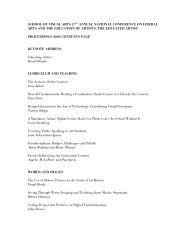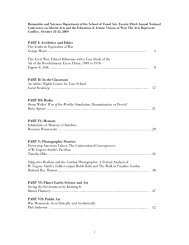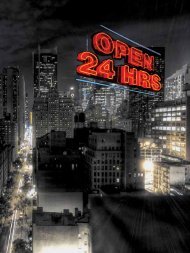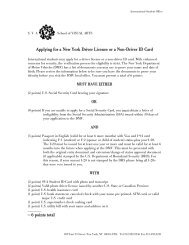SECTION 1 - via - School of Visual Arts
SECTION 1 - via - School of Visual Arts
SECTION 1 - via - School of Visual Arts
Create successful ePaper yourself
Turn your PDF publications into a flip-book with our unique Google optimized e-Paper software.
THEIR FACES BRIEF AS PHOTOS (John Berger)<br />
Bozenna Wisniewska<br />
Alberta College <strong>of</strong> Art and Design<br />
The premise <strong>of</strong> my paper is to address the passage <strong>of</strong> hope, despair and the role that culture<br />
plays in transforming dystopian experiences into ones <strong>of</strong> meaning. One <strong>of</strong> the most powerful<br />
documents that, in the face <strong>of</strong> total annihilation and destruction, presents the strength culture<br />
can instill in people is The Ringelblum Archive. Emanuel Ringelblum was a historian,<br />
pedagogue and social activist who dedicated his knowledge and his life in the Warsaw Ghetto to<br />
this archival collection. Its purpose was to record all aspects <strong>of</strong> Ghetto life. Three caches <strong>of</strong> the<br />
archives were hidden in the Ghetto between 1942 and 1943. Two <strong>of</strong> them were recovered, the<br />
third was lost, most likely forever.<br />
The German invasion <strong>of</strong> Poland on September 1, 1939 started a chapter <strong>of</strong> tragedy and horror,<br />
it also started a chapter <strong>of</strong> courage. In her book, The Rape <strong>of</strong> Europa, Lynn H. Nicholas points<br />
directly to how culture can become an endangered species and can be “captured” and<br />
destroyed together with the people responsible for creating it. The author, in her thorough<br />
investigation <strong>of</strong> the German invasion <strong>of</strong> Europe, concentrates on the systematic and deliberate<br />
actions <strong>of</strong> the Germans in destroying the cultures <strong>of</strong> the countries they violently conquered.<br />
Poland was the first to be invaded and the first to painfully witness the horrors <strong>of</strong> its cultural<br />
heritage being demolished:<br />
For Poland was to become Germany’s creature totally. Its culture and peoples<br />
were to be eliminated and replaced by Hitler’s “New Order.” The Nazis were<br />
only too eager to put their racial theories into actual practice in a place where<br />
resistance could be countered with total brutality. They believed without any<br />
qualms that Slavs, Christian or otherwise, were so inferior that they could not<br />
be considered humans. They, along with Jews, were the “degenerate art” <strong>of</strong> the<br />
human race. 1<br />
The “degenerate” races, Jews, Poles and others, cherished their “degenerate” culture and<br />
protected it with courage.<br />
The strength <strong>of</strong> culture lies in its ability to maintain integrity and to become a source <strong>of</strong><br />
inspirational energy in traumatic instances. We need this supply <strong>of</strong> inspiration for our lives to<br />
be meaningful and valuable. It is only too easy in tragic times filled with horror, <strong>of</strong> not knowing<br />
how to survive, to lose touch with one’s roots, to lose touch with one’s culture. The voice that<br />
tells us to maintain this contact can be just a whisper, but it elevates us beyond fear.<br />
To flee dystopia with an authentic and conscious realization is not an act <strong>of</strong> escapism but,<br />
rather, a courageous gesture that transcends brutal reality.<br />
At a conference <strong>of</strong> SS <strong>of</strong>ficers on September 21,1939, before the surrender <strong>of</strong> Poland, Heydrich<br />
and Eichmann drew up instructions for their Einsatzgruppen (Special Forces), “to prepare a list<br />
<strong>of</strong> Polish . . . intellectuals <strong>of</strong> all types, for a fate as yet unclear,” and recommended that the<br />
Jews be concentrated in ghettos “for better control.” 2<br />
In November 1940 the Jewish Ghetto in German occupied Warsaw was sealed <strong>of</strong>f. Three<br />
hundred thousand people, most <strong>of</strong> them displaced from their homes, crowded in to the caged<br />
quarters and were forbidden to go beyond the walls. How to live beyond surviving? One way is<br />
to avoid apathy, if that is at all possible in conditions in which a people’s life and culture is<br />
being degraded, demolished, shredded into pieces:<br />
6








